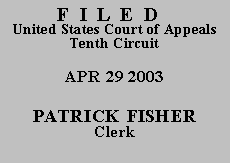

Mark Jarmie and Jason Bowles, Sharp and Jarmie, P.A., Albuquerque, New Mexico, for Movant-Appellant Thomas L. English.
David Weaver, Vinson & Elkins L.L.P., Austin, Texas, for Amicus National Association for Assistant United States Attorneys.
Gonzales was a complex, highly intense criminal prosecution in which the government charged twenty-three members of an Albuquerque street gang with various gang-related crimes including murder, attempted murder, drug trafficking, racketeering, and conspiracy. English was the lead prosecutor. During the discovery stage, the district court issued an order suppressing the testimony of a material witness as a sanction for prosecutorial violations. Specifically, the district court found that the government had improperly coerced the testimony of the witness by issuing an arrest warrant that could be avoided if she cooperated, and that English had misrepresented to the court the extent of the government's contact with and control over the witness in order to avoid producing her to defense counsel.
The government filed an interlocutory appeal from the district court's suppression order, and we affirmed in part, reversed in part, and remanded. United States v. Gonzales, 164 F.3d 1285, 1293 (10th Cir. 1999). We rejected the district court's determination that the government had improperly coerced the material witness, id. at 1289-91, but affirmed the district court's conclusion that the government had misrepresented the extent of its contact with and control over the witness and interfered with defense access to her. Id. at 1292. Further, we concluded that the sanction of suppressing the witness' testimony was too severe and remanded to the district court for consideration of lesser sanctions, such as "allowing the witness to be redeposed by defense at government expense, censuring or fining the government attorneys involved in the misconduct, or recommending disciplinary proceedings against the government attorneys involved." Id. at 1293.
Following remand, the Disciplinary Board of the Supreme Court of New Mexico commenced inquiry into a complaint filed against English by defense counsel. The Disciplinary Board, after conducting an investigation of English based on his purported violation of the Rules of Professional Conduct in connection with Gonzales, issued an opinion finding there was insufficient evidence to support probable cause that he had engaged in misconduct.
Approximately nine months after the Board completed its investigation, the district court conducted an in camera hearing to determine whether personal sanctions should be imposed against English. By this time, the defendants in Gonzales had pled guilty and had been sentenced. At the in camera hearing, English apologized for any actions on his part that might have led the court to believe he was not respecting its authority. English also submitted a copy of the Disciplinary Board's report to the court. A representative for the defendants stated that the question of sanctions was for the court to decide and the defendants would make no recommendation regarding the matter. The district court stated that the case had been difficult for all parties involved, and that English and the other government attorneys had not made it easier with their tactics. The court also noted that defense counsel had caused their share of problems with repeated allegations of prosecutorial misconduct, many of which were unfounded. The court stated its belief that everyone had learned from the experience and concluded there would "be no further sanctions imposed in this matter." Aplt. App., Exh. 10 at 619.
Approximately three months later, the district court issued an order memorializing the in camera hearing. The order began by restating the relevant facts, and then stated:
As the Court stated from the bench, this was a very difficult and trying case for everyone involved. However, the fact that this case was very tense and emotional does not absolve those who are entrusted with the power and authority of the State of their responsibilities as Officers of the Court. Armed with the power to deprive people of their liberty, the Government has a duty to ensure justice. The Government is not simply an adversary. The Government's focus should not be to win at all costs, but to advance integrity and fairness in our legal system.
While this Court does not approve of the conduct of the Government in this case, this Court does not wish to prolong this matter any further. Counsel for the defendants did not take a position on the sanctions this Court is to impose. The Assistant United States Attorney has been before the State Disciplinary Board for his conduct in this case, and has suffered the consequences of his conduct in his community of fellow prosecutors as well as in the defense community. The Court trusts that the Government has learned from this experience, and in future cases will use its power not simply to gain the best advantage, but to make decisions that advance the fairness and integrity expected of those of us entrusted with the awesome power to decide people's lives. Therefore, the Court declines to impose sanctions.
Aplt. App., Exh. 1 at 448-49. English, on his own behalf, filed a motion asking the district court to reconsider its order. English argued that the district court's order constituted a criminal contempt sanction because it operated as a public censure. He also complained that he did not receive notice that the in camera hearing would operate as a criminal contempt proceeding, and therefore he had not been allowed to present his side of the matter to the district court. He further argued that the only evidence before the court were the materials he submitted and those materials mandated a finding in his favor on the issue of misconduct. The district court denied English's motion in a written order issued June 3, 2001. The court concluded its April 18, 2001, order did not sanction English. Instead, it concluded that order "simply reiterate[d] the background of the case, stat[ed] previous findings that were made about the Government's conduct . . . and restate[d] in written form what the Court stated from the bench (to which the Government did not object at the time it was said)." Aplt. App., Exh. 3 at 510. English seeks appellate review of the district court's orders issued April 18 and June 3, 2001.
The threshold, and ultimately determinative, issue is whether the district court's orders rise to the level of a sanction.(1) Because we conclude they do not, we in turn conclude that English has nothing from which to appeal. In other words, we conclude that English was not injured in the legal sense by those orders and therefore lacks standing to appeal.
The Circuits are divided over whether a court's written decision finding attorney misconduct, but not specifically imposing any type of sanctions (monetary or otherwise), is appealable. On one end of the spectrum is the Seventh Circuit, which has held that an attorney may not appeal from an order that finds misconduct but does not result in monetary liability, despite the potential effects of the finding on the attorney's professional reputation. See Clark Equip. Co. v. Lift Parts Mfg. Co., 972 F.2d 817, 820 (7th Cir. 1992). On the other end of the spectrum is the Fifth Circuit, which has held that a written order finding an attorney engaged in professional misconduct, but not imposing monetary liability or other sanctions, constitutes an appealable injury. See Walker v. City of Mesquite, 129 F.3d 831, 832-33 (5th Cir. 1997) (stating "the importance of an attorney's professional reputation, and the imperative to defend it when necessary, obviates the need for a finding of monetary liability or other punishment as a requisite for . . . appeal"). Other circuits lie somewhere between. See Weissman v. Quail Lodge, Inc., 179 F.3d 1194, 1199 (9th Cir. 1999) (concluding that a formal finding of a violation of a specific rule of ethical conduct is akin to an explicit pronouncement of a reprimand and is thus appealable); In re Williams, 156 F.3d 86, 92 (1st Cir. 1998) (concluding that only judicial comments expressly identified as reprimands or sanctions are appealable); Sullivan v. Comm. on Admissions & Grievances, 395 F.2d 954, 956 (D.C. Cir. 1967) (holding a district court's written finding that attorney violated several judicial canons, but declining to impose sanctions, was appealable). Although we have held that "[c]ounsel have standing to appeal orders that directly aggrieve them," Weeks v. Indep. Sch. Dist., 230 F.3d 1201, 1207 (10th Cir. 2000), we have not decided whether an attorney is "directly aggrieved" by an order simply finding misconduct on his or her part.
We find it unnecessary to decide the issue here given the facts of this case. Even if we were to adopt the Fifth Circuit's position in Walker, i.e., that a written finding of professional misconduct is sufficient to provide an attorney standing to appeal, it is apparent there was no such finding in the orders that English now seeks to challenge. In its April 18, 2001, order, the district court reviewed its earlier findings and stated that the government's focus should not be to win at all costs but to advance integrity and fairness in the legal system. The court stated that it did not approve of the government's conduct and hoped it had learned from the experience, and in the future would use its power not to gain the best advantage, but to make decisions which would advance fairness and integrity. Importantly, and contrary to English's assertions, the district court made no new "factual findings" in its order, and instead restated its earlier findings (made in 1997). Although English argues the court's restatement of its earlier findings constitutes a "reimposition" of sanctions, he cites no authority for this proposition other than an obscure reference to defamation law which has no bearing on this case. Likewise, there were no "new" findings of misconduct in the court's June 3, 2001, order rejecting English's motion for reconsideration.
As a final matter, we reject the dissent's suggestion that English was "previously unable to fully contest this matter" or was otherwise denied due process. Dissent at 16. When the district court issued its original suppression order, the government filed a timely interlocutory appeal challenging that order. Although the district court's order included findings of misconduct on the part of English, English did not timely seek to intervene in the government's interlocutory appeal in order to challenge those findings, but instead waited to file a motion to intervene after this court's decision was issued. See generally Penthouse Int'l Ltd. v. Playboy Enterprises, Inc., 663 F.2d 371, 385-86, 392 (2d Cir. 1981) (allowing an attorney to intervene on appeal to contest the district court'sfinding of misconduct which was part of its reasoning in dismissing a complaint for discovery abuses). On remand, English made no effort to seek an evidentiary hearing, but instead proffered the record of the state disciplinary proceeding in an attempt to rebut the district court's findings that he had engaged in misconduct. Further, English made no attempt to appeal the findings of misconduct (i.e., those contained in the district court's suppression order) after final judgment was entered by the district court. See generally Cunningham v. Hamilton County, 527 U.S. 198, 209-10 (1999) (concluding that sanction orders are typically appealable only after final judgment is entered).
The appeal is DISMISSED.
01-2186, United States v. Gonzales
BALDOCK, Circuit Judge, dissenting.
Former Assistant United States Attorney Thomas English seeks review of district court post-judgment orders allegedly censuring him for misconduct in connection with his handling of a material witness in United States v. Gonzales, 95-CR-538 (D.N.M., filed Oct. 18, 1995). In a decision dismissing the appeal, the Court holds Attorney English "was not injured in the legal sense by those orders and therefore lacks standing to appeal." Court's Op. at 6-7. Because I believe the language of the district court's orders constituted a sanction sufficiently injurious to give Attorney English standing to appeal, I dissent.
The factual background necessary to begin understanding this appeal is set forth in United States v. Gonzales, 164 F.3d 1285 (10th Cir. 1999). Gonzales was a complex, highly intense criminal prosecution in which the Government charged twenty-three members of an Albuquerque street gang with various gang-related crimes including murder, attempted murder, drug trafficking, racketeering, and conspiracy. Attorney English was the Government's lead prosecutor. During the discovery stage, defense counsel moved to dismiss certain counts of the indictment due to "unconscionable" and "outrageous" government conduct surrounding a material witness. Without prior hearing, the district court entered a twenty-two page order limiting at trial the material witness' testimony as a sanction for purportedly ongoing prosecutorial misconduct. The order criticized both the Government and Attorney English. Upon the Government's motion to reconsider, the court entered a 119-page order suppressing the witness' statements and barring her testimony.
On interlocutory appeal pursuant to 18 U.S.C. § 3731, this Court upheld the district court's decision to sanction the Government, repeatedly specifying English by name, for what, in the Court's opinion, were "obvious" violations of district court discovery orders directing the Government to provide "'face-to-face'" access to its confidential witnesses.(1) The opinion described the Government's conduct as the "product of flagrant bad faith" and noted Defendants' "ability to prepare for trial was prejudiced by the government's obstruction of access to the subject witness." Gonzales, 164 F.3d at 1292. But the Court did not share the district court's view that prejudice to Defendants was irreparable. The Court therefore reversed the district court's choice of the "most severe available sanction, i.e., complete suppression of the witness' statements and trial testimony," and remanded "for consideration of less severe sanctions" including possible censure or referral to disciplinary authorities. Id. at 1292-93.
The Government moved unsuccessfully for panel rehearing, arguing the Court relied on inaccurate facts in citing Attorney English for misconduct. English also filed an unsuccessful pro se motion for leave to intervene before this Court. In his motion, English argued (1) he had not been a party before the district court; (2) he had no notice this Court would censure him so harshly; (3) he was not represented by counsel; and (4) he had been unable to defend his interest in his professional reputation because the Government feared he would become a witness and thus unable to continue as lead prosecutor in the case.
Following remand, the Disciplinary Board of the Supreme Court of New Mexico commenced inquiry into the matter on the complaint of defense counsel. Over the course of nearly a year, the Board conducted, consistent with due process, a complete investigation of Attorney English based on his purported violation of numerous Rules of Professional Conduct in connection with Gonzales. See, e.g., N.M. Rules Ann. 16-303 (Candor toward the tribunal); 16-304 (Fairness to opposing party and counsel); 16-404 (Dealing with unrepresented persons); 16-804 (Misconduct). The Board concluded the evidence was insufficient to support a finding of probable cause that Attorney English had engaged in misconduct before the district court. In a report favorable to Attorney English, a copy of which is attached hereto as an Appendix, the Chief Disciplinary Counsel for the Board found, among other things, that English did not make knowing misrepresentations to the district court and did not interfere with defense counsel's access to the subject witness.(2) The report further found: "Mr. English did as much as was humanly possible to comply with the court's discovery orders and facilitate the exchange of information." Disciplinary Counsel wrote:
I am not attempting to "overrule" the courts; it is merely that what a judge may find exasperating is not necessarily evidence that one has intentionally failed to expedite litigation, obstructed a party's access to evidence or disobeyed an obligation under procedural rules in violation of the Rules of Professional Conduct.[(3)]
Nine months after the Board issued its report exonerating Attorney English, the district court, on January 26, 2001, held an in camera hearing on remand to determine "whether or not personal sanctions should be imposed on Mr. Thomas L. English, Assistant United States Attorney." At the time of the hearing, all Defendants in the Gonzales case had pled guilty and had been sentenced. During the hearing, English submitted the Disciplinary Board's report to the court without objection from defense counsel. The district court, after thanking English, informed him "[t]here will be no further sanctions imposed in this matter."
At the hearing, the Government and defense counsel submitted a two page stipulated order to the district court (a point overlooked by this Court) which asked the court to find that "no fine, censure of any kind, or other sanction is appropriate against any of the government attorneys involved in this matter." The court did not enter the order. Instead, three months later, the district court, without further hearing and without warning, issued a written order on the matter which this Court in my opinion inaccurately characterizes as "memorializing the in camera hearing." Court's Op. at 5.
The district court noted the Disciplinary Board had found insufficient evidence to establish a violation of ethical rules, and reiterated that "no sanction shall issue" against Attorney English. But the court did not stop there. Quoting its original order suppressing the subject witness' statement and barring her testimony, the court referred to the "Government's 'course of conduct in pursuing this most serious of prosecutions that has forced the Court to issue countless admonitions and lesser sanctions in response to the Government's misconduct, . . . as well as misrepresentations made in open court . . . by lead Government counsel that interfered with Defendants' court-ordered access to [the subject witness].'" The district court noted this Court's approval of its findings on appeal and stated:
While this Court does not approve of the conduct of the Government in this case, this Court does not wish to prolong this matter any further. . . . The Assistant United States Attorney has been before the State Disciplinary Board for his conduct in this case, and has suffered the consequences of his conduct in his community of fellow prosecutors as well as in the defense community. The Court trusts that the Government has learned from this experience, and in future cases will use its power not simply to gain the best advantage, but to make decisions that advance fairness and integrity expected of those of us entrusted with the awesome power to decide people's lives. Therefore, the Court declines to impose sanctions.
Attorney English filed a motion to reconsider the foregoing order which the district court construed as a motion to alter or amend under Fed. R. Civ. P. 59(e). English characterized the court order as both a "public censure" and a "harsh, punitive, sanction" against him. In denying the motion, the court responded:
The Court has found that the Government committed misconduct in the course of the Gonzales case. The Tenth Circuit upheld that finding. The Government apparently wishes for this Court to reverse its previous findings, as well as those of the Tenth Circuit, in order to exonerate him. The Court decided not to impose sanctions, but it will not, and did not decide to, reverse its previous findings.
The Court is correct in initially addressing its jurisdiction over Attorney English's appeal.(4) I agree with the Court that the jurisdictional question is whether the district court's orders in fact constitute "sanction orders," for if they do not, then English has nothing from which to appeal. In other words, if English was not "sanctioned," he was not injured in the legal sense and has no standing to appeal.(5)
As the Court notes, the circuits are divided over whether a court's written decision finding attorney misconduct alone, though not formally labeled a sanction, is appealable. In a case similar to this, the D.C. Circuit held a written order finding an attorney violated ethical rules, but not formally imposing sanctions, constituted an appealable injury. Sullivan v. Committee on Admissions and Grievances, 395 F.2d 954 (D.C. Cir. 1967) (Burger, J.). As in this instance, "the District Court concluded for appropriate reasons not to impose sanctions in this case. However, the District Court . . . determined that [the attorney] was guilty of proscribed conduct and this determination plainly reflect[ed] adversely on his professional reputation. . . ." The D.C. Circuit concluded this reputational damage gave the attorney standing to appeal. Id. at 956.
The Fifth Circuit reached a like conclusion in another similar case. In Walker v. City of Mesquite, 129 F.3d 831, 832 (5th Cir. 1997), the district court found an attorney engaged in "blatant misconduct" by violating his obligation of candor to the court. Like here, the court levied no other sanction against the attorney. Rejecting the argument that an attorney's diminished reputation was not a cognizable injury for purposes of appeal, the Fifth Circuit wrote:
In the case at bar [the attorney] was reprimanded sternly and found guilty of blatant misconduct. The reprimand must be seen as a blot on [the attorney's] professional record with a potential to limit his advancement in governmental service and impair his entering into otherwise inviting private practice. We therefore . . . hold that the importance of an attorney's professional reputation, and the imperative to defend it when necessary, obviates the need for a finding of monetary liability or other punishment as a requisite for appeal of a court order finding professional misconduct.
Id. at 832-33.
Taking a different approach, a divided panel of the First Circuit disagreed with the Fifth Circuit in In re Williams, 156 F.3d 86 (1st Cir. 1998). The district court affirmed the factual finding of the bankruptcy court that two government tax attorneys failed to comply with discovery requests. The bankruptcy court "harshly criticized" the attorneys, "characterizing their conduct as obstructionist and unjustified." Id. at 88. The First Circuit dismissed the attorneys' appeal, holding "[w]ords alone" constitute an appealable sanction only "if they are expressly identified as a reprimand." Id. at 92.
"Mindful that every pejorative expression or criticism by a court of a lawyer is not subject to appeal," the dissent viewed the bankruptcy court's words as "not a mere finding of fact, but an ultimate statement of censure, intended to punish counsel." Id. at 96 (Rosenn, J., dissenting). The dissent protested: "Denying [attorneys] the right to an appeal in a matter impugning their character, competence or integrity . . . and which publicly and harshly censures them merely because the chastisement is not expressly a 'formal reprimand' exalts form over substance." Id. at 99.
Three of seven active judges on the First Circuit dissented from denial of the attorneys' request for rehearing en banc. That dissent aptly noted among other things that "[b]eing branded unethical or incompetent by a federal judge can essentially destroy a lawyer's career." Williams v. United States, 158 F.3d 50, 50 (1st Cir. 1998) (Lynch, J., dissenting from denial of reh'g en banc). Like the panel dissent, the dissent from denial of rehearing en banc also criticized the opinion's formalism: "This sort of formalism, which has been abandoned in so many areas of the law . . . seems especially inappropriate in an area which the premise of any appeal is likely to be the assertion that the order was issued by an intemperate decisionmaker." Id. at 51.
Two decisions from the Ninth Circuit are also noteworthy. Weissman v. Quail Lodge, Inc., 179 F.3d 1194 (9th Cir. 1999) relied on Williams to conclude that a district court's disparaging comments about counsel did not alone constitute an appealable sanction against him. The attorney intervened on behalf of a client to object to a class action settlement. The court entered an order finding the attorney's intervention "reflects a serious lack of professionalism and good judgment." Id. at 1196. The court described his objections as "groundless, contrived and misplaced." Id. Rejecting the notion the court's words constituted a formal reprimand, the Ninth Circuit "decline[d] to find . . . that any time a court includes critical words about an attorney's conduct in an order, those words constitute a formal reprimand." Id. at 1199.
The Ninth Circuit subsequently narrowed Weissman's reach in United States v. Talao, 222 F.3d 1133 (9th Cir. 2000). The district court found an attorney had violated the California Rule of Professional Conduct prohibiting ex parte communications with a represented party. The Ninth Circuit drew a line "between routine judicial commentary and commentary that is inordinately injurious to a lawyer's reputation," id. at 1137, and held the court's finding, although not formally labeled a sanction, constituted an appealable sanction order:
Weismann and Williams . . . do not determine our jurisdiction in this case. Those cases addressed only instances in which mere judicial criticism constitutes an appealable sanction. The district court . . . , however, did more than use "words alone" or render "routine judicial commentary." Rather the district court made a finding and reached a legal conclusion that [the attorney] knowingly and wilfully violated a specific rule of ethical conduct. Such a finding, per se, constitutes a sanction. The district court's disposition bears a greater resemblance to a reprimand than to a commentary merely critical of inappropriate attorney behavior. . . . If the court's formal finding is permitted to stand, it is likely to stigmatize [the attorney] among her colleagues and . . . could have a serious detrimental effect on her career. . . . We have no reluctance in concluding that the district court's finding of an ethical violation by [the attorney] is an appealable sanction.
Id. at 1137-38.
An attorney's professional reputation undoubtedly is his or her most valuable asset. See, e.g., Cooter & Gell v. Hartmarx Corp., 496 U.S. 384, 413 (1990) (Stevens, J., concurring in part) ("I still believe that most lawyers are wise enough to know that their most precious asset is their professional reputation."). Findings of serious ethical misconduct can cast dark shadows over an attorney's career. See, e.g., McBryde v. Committee to Review Circuit Council Conduct, 264 F.3d 52, 81 (D.C. Cir. 2001) (noting that an attorney's interest in an untarnished reputation is greater than the "mere loss of money."). Accordingly, I reject the proposition that before an order asserting counsel's ethical misconduct constitutes an appealable sanction, a court must either impose monetary penalties or label findings of such misconduct a formal reprimand or censure. "Stripped to essentials this proposition would maintain that an attorney has more of a reason and interest in appealing the imposition of a $100 fine than appealing a finding and declaration by a court that counsel is an unprofessional lawyer prone to engage in blatant misconduct." Walker, 129 F.3d at 832. "Monetary sanctions only affect one's bank account; linguistic sanctions can pierce the heart and reputation of the lawyer at whom they are aimed and, in the long run, probably will strike the lawyer's bank account as well." Williams, 156 F.3d at 97 (Rosenn, J., dissenting).
In no way do I mean to imply that every negative comment or observation from a judge's pen about an attorney's conduct or performance is appealable. See, e.g., Weissman, 179 F.3d at 1199. It is not. But demanding the requisite formality the First Circuit imposed in Williams simply is unfair to the overwhelming majority of attorneys who conduct themselves in accordance with rules of professional responsibility and ably serve as officers of the court. Under Williams' rationale, a court presumably could find an attorney engaged in outrageous, even felonious misconduct, while insulating its findings, justifiable or otherwise, from appellate review by refraining from labeling them a sanction:
[T]here are few checks on what judges say about counsel other than the judge's own prudence. A lawyer attempting to pursue a client's interest zealously may, if faced with an arbitrary judge or a judge who has an erroneous view of the facts, end up with a blot on his or her record that will never be erasedunless an appeal is possible to correct the problem.
Williams v. United States, 158 F.3d 50, 50 (1st Cir. 1998) (Lynch, J., dissenting from denial of reh'g en banc). Needless to say, "[a]rmed with life tenure and broad discretion, a [federal] judge can do great harm to a lawyer's career, while the attorney has virtually no recourse at all." Steve Lubet, Just Who Made Federal Judges God?, Chic. Trib., Aug. 10, 2001, at 23. I am satisfied that an attorney's ability to fight reputational damage arising from a court order should not be dependent on how the court labels that order.
Criticism that this approach is unworkable and "tantamount to declaring open season on trial judges" is misplaced. See Williams, 156 F.3d at 91. The D.C. Circuit, in a case where a disciplinary committee found ethical rules violations but did not formally impose sanctions, adopted the same approach over thirty years ago. Sullivan, 395 F.2d at 954. The problems the First Circuit foresaw in Williams have not materialized. I believe the Williams approach is more akin to declaring open season on trial attorneys. The possibility of appellate review is a proper check in those rare instances where a federal court is too willing to unilaterally issue an idle reprimand. Meanwhile, an attorney's self interest directs that he or she appeal only where the court's words are especially damaging to the attorney's reputation and perhaps unjustified. This is because an attorney appealing a reprimand "takes the risk that this court, reaching the merits, will agree that the sanction is justified thus giving the sanction far more force than it would have had if it had come from a trial judge unendorsed by a reviewing court." Williams, 158 F.3d at 51 (Lynch, J., dissenting from denial of reh'g en banc).
Unlike the Court, I conclude the district court's unequivocal language in its written orders on remand constitutes a sanction sufficiently injurious to Attorney English's professional reputation to provide him standing to appeal. See Weeks v. Independent Sch. Dist. No. I-89, 230 F.3d 1201, 1207 (10th Cir. 2000) ("Counsel have standing to appeal orders that directly aggrieve them.").(6) The Court's conclusion that the district court's two post-judgment orders made no "new 'factual findings'" of misconduct," Court's Op. at 8, seems patently unfair given that Attorney English was previously unable to fully contest this matter. See supra at 4. Moreover, the Court's decision disregards our duty to review questions of ethical misconduct within the parameters of due process. To be sure, the court's orders state no sanction shall issue. See Sullivan, 395 F.2d at 956. A careful reading of the orders, however, convinces me that their substance trumps their form. See Bolte v. Home Ins. Co., 744 F.2d 572, 573 (7th Cir. 1984) ("[A]lthough sanctions in the usual sense were not imposed, the judge's refusal to vacate his earlier finding of misconduct imposed or confirmed a sanction of sorts, in a realistic though not formal sense, on the lawyers.").
Without explanation, the district court's orders all but ignore the New Mexico Supreme Court Disciplinary Board's findingsfindings made after full and fair investigation. The district court's written orders plainly reprimand Attorney English a second time for blatant ethical misconduct and an abuse of power. While not referring specifically to English by name or citing the applicable rules of professional conduct, the court refers to "misrepresentations made in open court . . . by lead Government counsel that interfered with Defendants' court-ordered access to [the subject witness]." By all accounts, the district court engaged in more than "routine judicial commentary." Talao, 222 F.3d at 1137. No citation to authority is necessary to conclude that such misrepresentation violates long established rules of professional conduct. Insistence upon candor to the court is perhaps the most important ethical precept of all.(7)
The district court further notes Attorney English used his power "simply to gain the best advantage," and consequently suffered for his misconduct: "The Assistant United States Attorney has been before the State Disciplinary Board for his conduct in this case, and has suffered the consequences of his conduct in his community of fellow prosecutors as well as in the defense community."(8) The district court's orders served not only to emphasize the court's prior findings of ethical misconduct and to illustrate the court's disagreement with the Disciplinary Board's contrary findings, but also to strike another blow to Attorney English's professional reputation. And yet this Court concludes Attorney English was not sufficiently injured to provide him standing to appeal. The language of the district court's orders did much more than "memorializ[e][] the in camera hearing." Court's Op. at 5. The orders adjudge Attorney English unethical. For these reasons, I believe Attorney English has standing to maintain this appeal, and now proceed to the merits.
Matters of attorney discipline by their very nature often come to us outside the common adversarial context. I am mindful that no one has recorded opposition to Attorney English's request for relief in this case, and thus I proceed cautiously. The proper starting point is to consider the source of the district court's power to sanction Attorney English for noncompliance with pretrial discovery orders extending beyond the requirements of criminal rules and statutes. See Gonzales, 164 F.3d at 1291 (noting "Fed. R. Crim. P. 16 is inapplicable here because it does not require the government to make its witnesses available for defense interviews.").
Assuming the district court legitimately imposed such orders (a question not before the Court, see supra n.1), the court's ability to enforce those orders rests in its "inherent power." Whether exercised in a civil or criminal context, "[t]he inherent powers of federal courts are those which are necessary to the exercise of all others." Roadway Express, Inc. v. Piper, 447 U.S. 752, 764 (1980). "Because inherent powers are shielded from direct democratic controls, they must be exercised with restraint and discretion." Id.
The extent of these powers must be delimited with care, for there is a danger of overreaching when one branch of the Government, without benefit of cooperation or correction from others, undertakes to define its own authority. In many instances the inherent powers of the courts may be controlled or overridden by statute or rule. Principles of deference counsel restraint in resorting to inherent power, and require its use to be a reasonable response to the problems and needs that provoke it.
Degen v. United States, 517 U.S. 820, 823-24 (1996). "The conceded power of federal district courts to supervise the conduct of attorneys should not be used as a means to substantially alter federal criminal law practice." Grievance Committee v. Simels, 48 F.3d 640, 644 (2d Cir. 1995). A court must remain mindful that its inherent power "is limited by the necessity giving rise to its exercise." Degen, 517 U.S. at 829. "In short, the inherent power springs from the well of necessity, and sparingly so." Natural Gas Pipeline Co. v. Energy Gathering, Inc., 2 F.3d 1397, 1407 (5th Cir. 1993).
In this case, the district court entered its post judgment orders (1) after the district court had already reprimanded English for his conduct, (2) after Defendants had pled guilty and been sentenced, (3) after the New Mexico Supreme Court's Disciplinary Board had exonerated English, and (4) after the court announced at hearing that no further sanctions would issue. The district court's written orders serve no meaningful purpose other than to pour new salt into old wounds. In short, the district court's post-judgment orders sternly denouncing Attorney English's conduct were unnecessary at that stage of the proceedings and thus beyond the court's inherent power to issue.
I am well aware that this Court also disapproved of Attorney English's apparent misconduct at the discovery stage. Gonzales, 164 F.3d at 1291-92. At that time, we suggested, among other things, "recommending disciplinary proceedings against the government attorneys involved." Id. at 1293. That is precisely what occurred, albeit on the complaint of defense counsel. Thereafter, for the first and only time in this case, an independent, impartial Disciplinary Board investigated the alleged misconduct with all the procedural safeguards necessary to ensure a fair decision. This Court should not lightly disregard the Disciplinary Board's findings and conclusions made after thorough inquiry where our prior decision was based on a limited record.(9) While not conclusively binding on a federal court, a state supreme court's determination in a disciplinary matter "brings title deeds of high respect." Theard v. United States, 354 U.S. 278, 282 (1957). Andrew L. Kaufmann, Judicial Ethics: The Less-Often Asked Questions, 64 Wash. L. Rev. 851, 864 (1989), provides the proper perspective:
Public criticism of a lawyer in an opinion in which the court does not undertake the job of fact-finding with all the procedural safeguards involved in a disciplinary proceeding may destroy or severely damage a lawyer's reputation. When the lawyer has no chance to defend, the mere mention of the fact of reference to disciplinary authorities is problematic, especially if accompanied by an unfavorable characterization of the lawyer's conduct.
A court "that has the power but is unwilling to undertake the disciplinary process itself, either directly or through a master (or other body appointed by it), should be very cautious about specific comments it makes about discipline." Id. at 866-67.
Indeed, a federal court unprepared to provide procedural safeguards to an attorney in a case such as this should defer to the findings and conclusions of a state disciplinary board where no good reason appears why those findings and conclusions should not be accepted or given effect. See Selling v. Radford, 243 U.S. 46, 50 (1917); In re Gordon, 640 F.2d 1143, 1150 (10th Cir. 1981); see also Thread, 354 U.S. at 282 (stating that Selling "authoritatively expounded" the recognition a federal court must accord a state judgment of disbarment). Federal courts should defer to state court disciplinary findings and conclusions unless an independent review of the state record reveals (1) a state procedure that lacks due process because of failure to provide adequate notice and opportunity to be heard, (2) an "infirmity of proof," or (3) some other "grave reason" why the federal court should not defer to the state proceedings. Selling, 243 U.S. at 51. Selling remains the law today. See, e.g., In re Caranchini, 160 F.3d 420, 424-25 (8th Cir. 1998). This Court's failure to require the district court to provide any explanation for its refusal to defer to the findings of the State Disciplinary Board makes this case all the more troubling.
For the foregoing reasons, I would hold Attorney English has sustained sufficient reputational injury from the district court's post-judgment orders to establish his standing to appeal. As to the merits, I would at a minimum strike from the record the district court's orders herein dated April 18, 2001 and June 3, 2001 as beyond its inherent authority. I would direct that the district court's statement following the in camera hearing on January 26, 2001 that "[t]here will be no further sanctions imposed in this matter" serve as its final order in this matter.
Accordingly, I dissent.
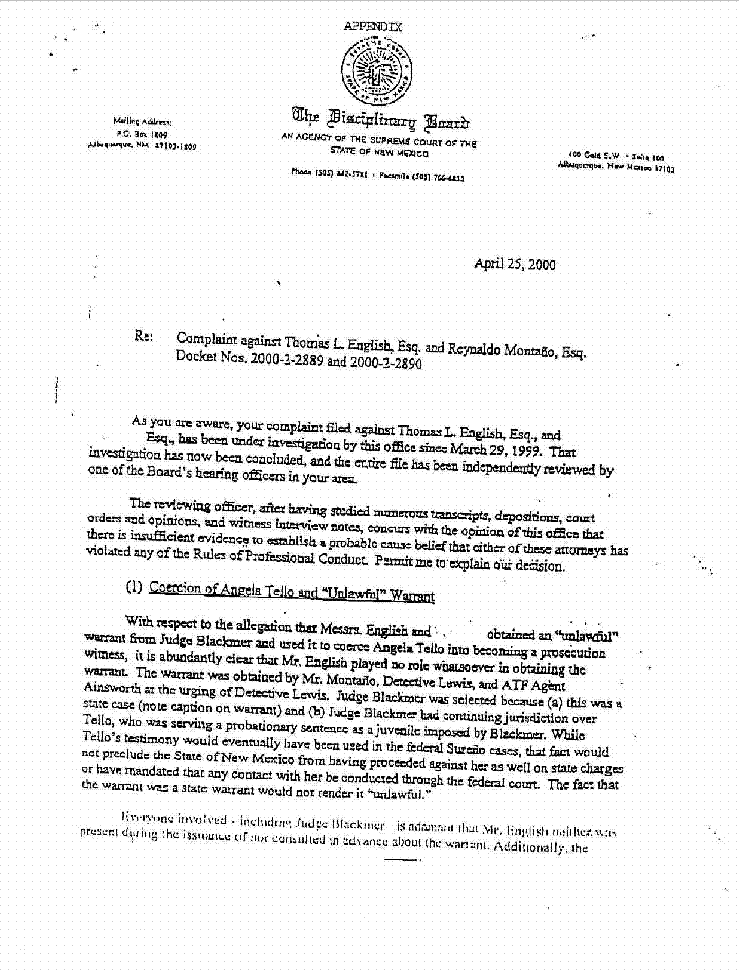
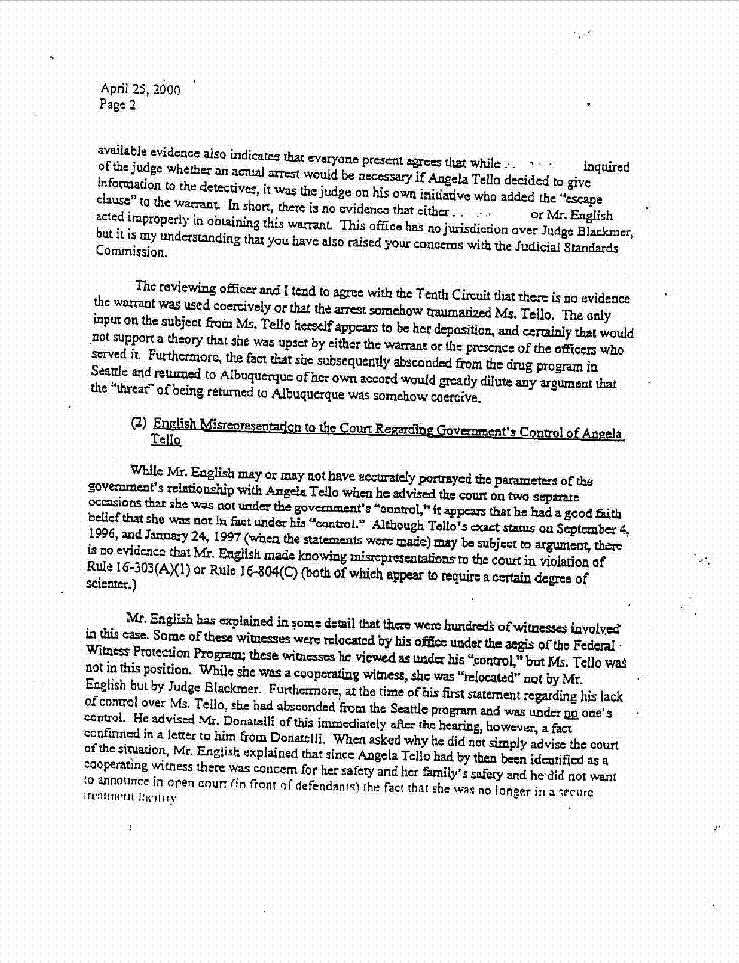
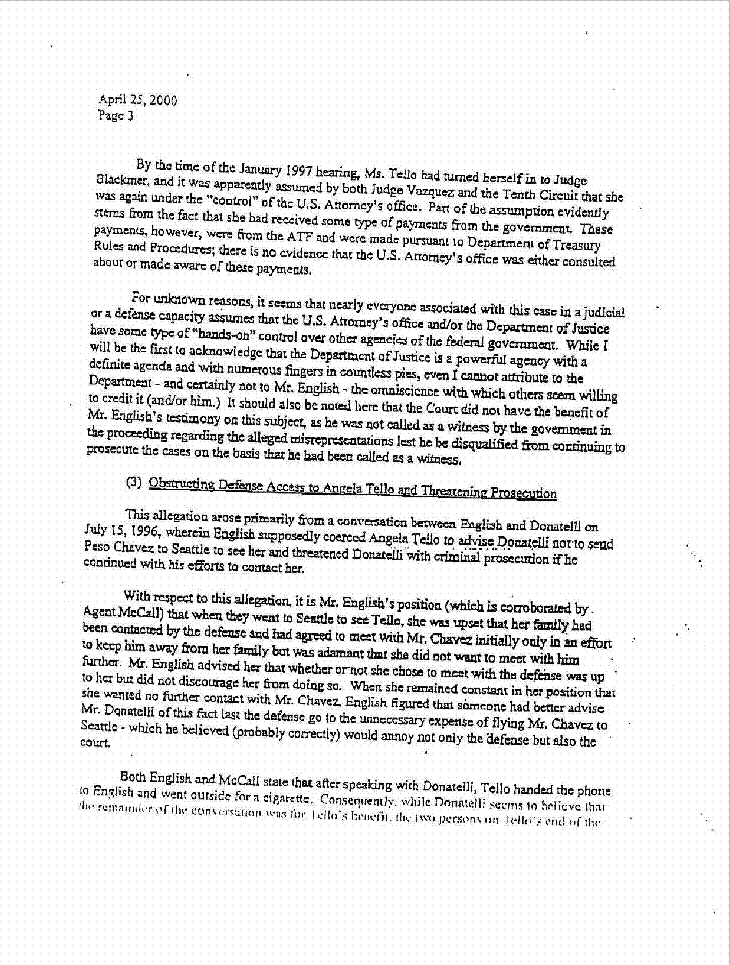
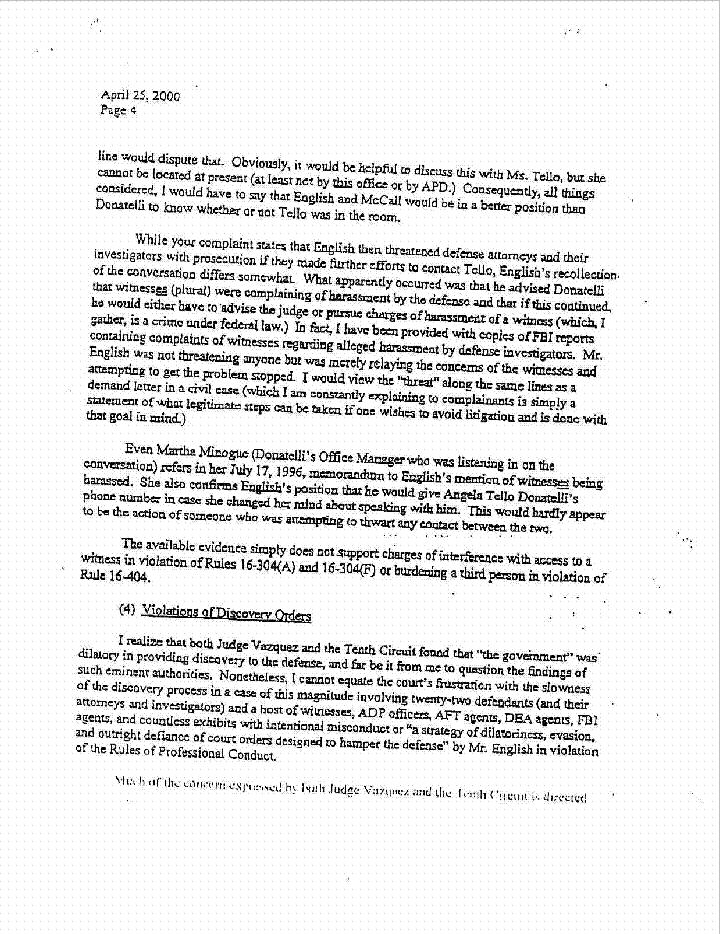
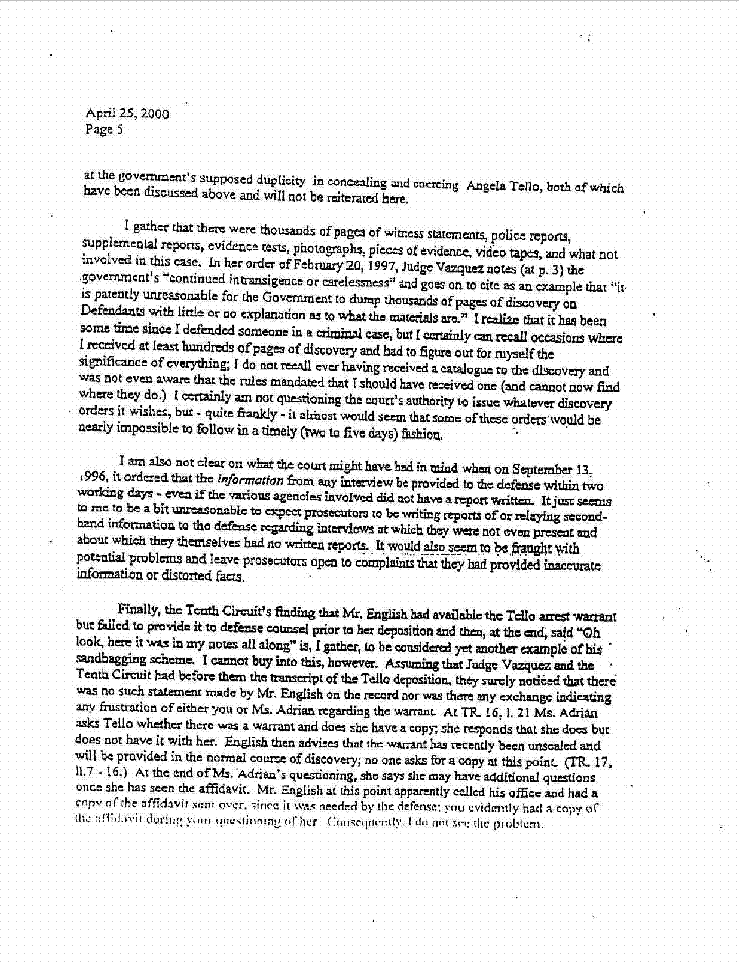
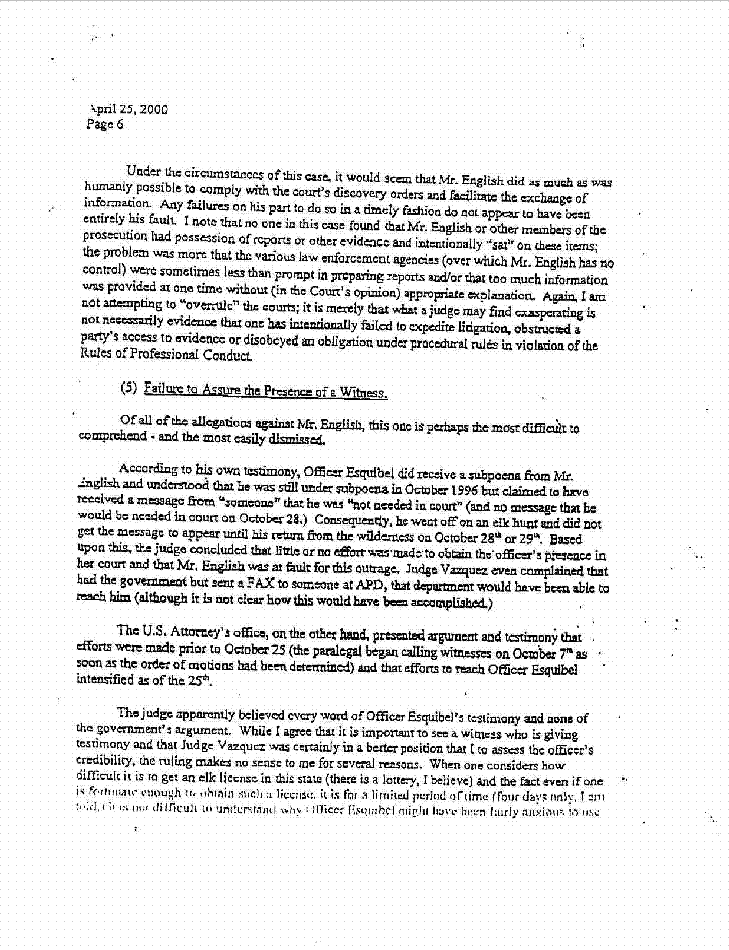
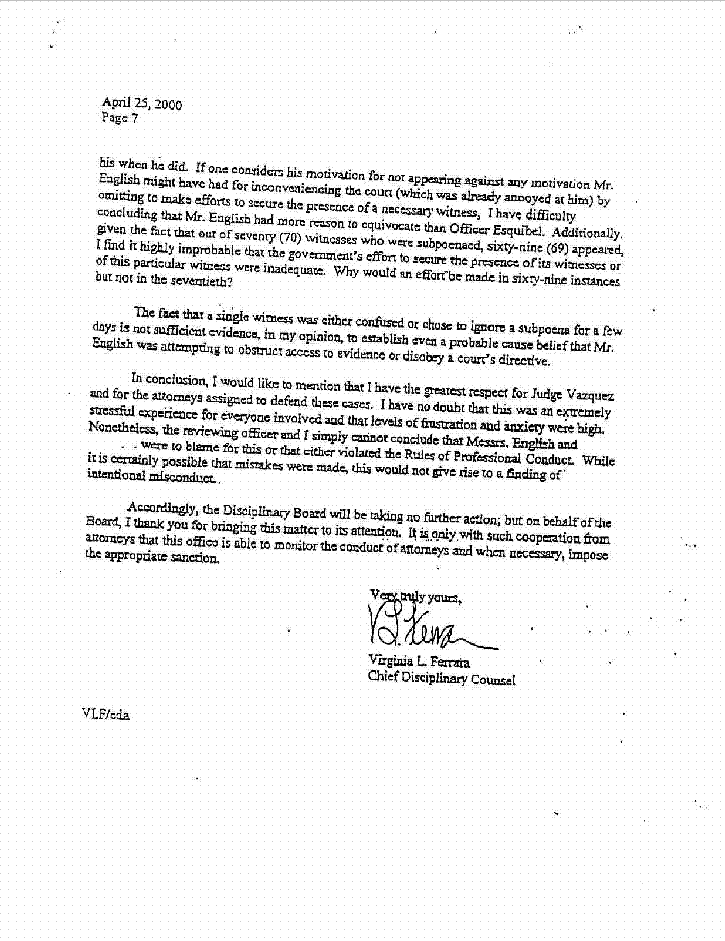
*. The majority opinion is published only because the dissent is published.
2. After examining the briefs and appellate record, the panel determined unanimously that oral argument would not materially assist the determination of this appeal. See Fed. R. App. P. 34(a)(2)(C); 10th Cir. R. 34.1(G). We therefore ordered the case submitted without oral argument.
1. There is no doubt that the order from which English seeks to appeal is "final" for purposes of 28 U.S.C. § 1291, and that English's appeal is post-judgment.
1. As we acknowledged in Gonzales, 164 F.3d at 1291, the Federal Rules of Criminal Procedure do not require such "face-to-face" encounters. See Fed. R. Crim. P. 16. Indeed, criminal defendants are entitled to rather limited discovery under federal law. See Degen v. United States, 517 U.S. 820, 825 (1996). The record in this case, however, reveals the district court, in its "supervisory power," entered discovery orders exceeding the requirements of the federal discovery rules which the Government never challenged on appeal. The district court admitted "the Government's discovery obligations here are not based on Rule 16." In addition to requiring the aforesaid encounters, the district court, for instance, required the Government to provide defense counsel addresses and in-person access to witnesses who had been placed in the Witness Security Program to protect them from Defendants. The court further required the Government to provide defense counsel, within two days of an interview, any information that an agent had obtained from a person about the case regardless of whether the Government intended to use that person as a witness or had prepared a report. But see id. (criminal defendants have no general right to obtain statements of Government witnesses before they testify). Such a requirement may very well contravene the mandatory language of the Jencks Act, 18 U.S.C. § 3500. While a criminal court possesses some inherent discovery power, see, e.g., United States v. Golyansky, 291 F.3d 1245, 1248-49 (10th Cir. 2002) (upholding discovery order requiring disclosure of Brady material as it became available), such power is not unlimited. The Supreme Court has explained "it is well established that even a sensible and efficient use of the supervisory power is invalid if it conflicts with . . . statutory provisions. To allow otherwise would confer on the judiciary discretionary power to disregard the considered limitations of the law it is charged with enforcing." Bank of Nova Scotia v. United States, 487 U.S. 250, 254 (1988) (internal brackets, ellipses, quotations, and citations omitted); see also United States v. Widgery, 778 F.2d 325, 329 (7th Cir. 1985) (Easterbrook, J.) ("The supervisory power is part of the common law, and no court has a common law power to disregard a rule or statute that was within the authority of Congress to enact."); United States v. Simpson, 927 F.2d 1088, 1090 (9th Cir. 1991) (Kozinski, J.) ("The supervisory power simply does not give the courts the authority to make up the rules as they go, imposing limits on the executive according to whim or will."). This Circuit has not addressed to what extent a district court possesses "supervisory power" in criminal matters to order discovery beyond the limits of Rule 16 or other federal law. Cf. United States v. United States District Court, 717 F.2d 478, 480-82 (9th Cir. 1983) (Kennedy, J.,) (holding the Freedom of Information Act did not extend the scope of discovery under Fed. R. Crim. P. 16 and issuing a writ of mandamus directing the district court to limit discovery consistent with Rule 16).
2. Although the report originally was confidential, Attorney English has made it a part of the public record in this case.
3. After the Board issued its report, Attorney English, now represented by counsel, unsuccessfully filed a "Petition for Relief Under the All Writs Act, and for a Writ of Error Coram Nobis or Other Extraordinary Writ, or in the Alternative, a Motion to Recall the Mandate Seeking Review of this Court's Opinion in United States v. Gonzales, 164 F.3d 1285 (10th Cir. 1999)."
4. A sanction order against counsel generally is appealable only after entry of final judgment, and then only as a "final decision" under 28 U.S.C. § 1291. Law v. National Collegiate Athletic Ass'n, 134 F.3d 1025, 1029 (10th Cir. 1998); G.J.B. & Assoc., Inc. v. Singleton, 913 F.2d 824, 829 (10th Cir. 1990). English's appeal is post-judgment and the "decision" he appeals from is "final."
5. Compare Bolte v. Home Ins. Co., 744 F.2d 572 (7th Cir. 1984). In Bolte, the district court found two insurance defense attorneys had concealed a defense witness' identity and statements. The court described their conduct as "reprehensible," but imposed no formal sanction upon them. The Seventh Circuit dismissed the attorneys direct appeal for lack of a "final decision." Judge Posner broadly reasoned, perhaps correctly in the abstract, that "Congress, in making 'final decisions' of district courts appealable in 28 U.S.C. § 1291, [did not] mean[] to allow people who were not even parties to a lawsuit in the district court to appeal from a wounding or critical or even palpably injurious comment or finding by a district judge." Id. at 573. Bolte's reasoning, which may reflect "distaste for the [attorneys'] position or lack of concern with injury of the nature alleged" has been labeled "dubious." 15A Charles A. Wright, Arthur R. Miller, & Edward H. Cooper, Federal Practice and Procedure § 3902.1, at 130-31 & n.52 (1992). Given Bolte's holding, the court did not definitively resolve whether "the stigma of being accused by a federal judge of 'reprehensible' conduct is [in itself] injury enough to satisfy the standing requirement in Article III of the Constitution." Bolte, 744 F.2d at 573. The court suggested it might "by analogy to the injury on which the tort of defamation is based." Id. Similarly, the Seventh Circuit decision which the Court cites, Clark Equip. Co. v. Lift Parts Mfg. Co., 972 F.2d 817, 820 (7th Cir. 1992), did not turn on standing but rather relied exclusively on Bolte (i.e., the lack of a final decision) to hold "an attorney may not appeal from an order that finds misconduct but does not result in monetary liability, despite the potential reputational effects." The Federal Circuit recently questioned both Bolte and Clark Equipment. Precision Specialty Metals, Inc. v. United States, 315 F.3d 1346, 1350-53 (Fed. Cir. 2003) (holding a court's formal reprimand of an attorney for misconduct appealable).
6. The district court in Weeks disqualified plaintiff's counsel from participating in the litigation due to improper ex parte communications. We held counsel had standing to appeal the disqualification order based on injury to her professional reputation. "The disqualification order is a sanction directly affecting [counsel], and a favorable court decision would likely provide at least some redress from the injury from the sanction because it could help ameliorate the damage to her professional reputation from the sanction order." Weeks, 230 F.3d at 1207.
7. Notably, neither Williams nor Weissman involved findings of intentional misrepresentation to the court.
8. Attorneys under the jurisdiction of the Department of Justice (DOJ) must report to their supervisors any "statement by a judge or magistrate indicating a belief that misconduct by a Department employee has occurred." United States Attorneys' Manual, § 1-4.120(A). Whenever a judge or magistrate makes a finding that a DOJ attorney has engaged in misconduct, the attorney must immediately report the finding to the DOJ Office of Professional Responsibility "regardless whether the matter is regarded as serious or non-serious." Id. § 14.120(B). Needless to say, a court may do much damage to an attorney's career within DOJ.
9. Whether the law of the case doctrine applies to questions of fact is uncertain. Johnson v. Champion, 288 F.3d 1215, 1226 (10th Cir. 2002). Even if the doctrine does apply to such questions, however, I do not believe it binds the Court in this case given the intervening change in circumstances, namely the Disciplinary Board's findings and conclusions. Law of the case principles are not absolute. See Kennedy v. Lubar, 273 F.3d 1293, 1299 (10th Cir. 2001). The doctrine is "to be applied at the sound discretion of the court to effectuate the proper administration of justice." United States v. Gama-Bastidas, 222 F.3d 779, 785 (10th Cir. 2000) (internal quotations omitted). Reasons for departing from the law of the case include (1) an intervening change in controlling law, (2) the availability of new evidence, (3) the need to correct clear error, and (4) the need to prevent manifest injustice. See Kennedy, 273 F.3d at 1299 n.6. Given the Board's findings, the latter three reasons seem particularly relevant here.